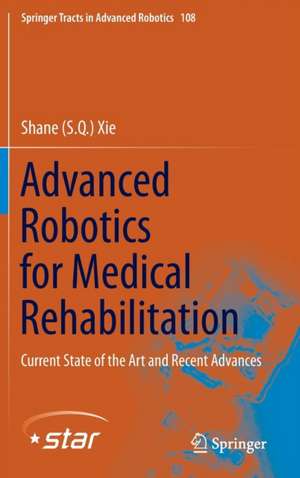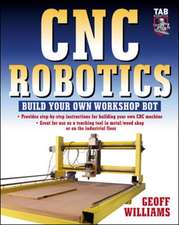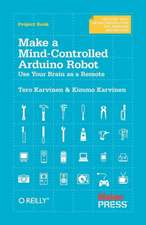Advanced Robotics for Medical Rehabilitation: Current State of the Art and Recent Advances: Springer Tracts in Advanced Robotics, cartea 108
Autor Shane (S.Q.) Xieen Limba Engleză Hardback – 12 noi 2015
Each chapter provides a description of the design of the device, the control system used, and the implementation and testing to show how it fulfils the needs of that specific area of rehabilitation. The book will detail new devices, some of which have never been published before in any journal or conference.
| Toate formatele și edițiile | Preț | Express |
|---|---|---|
| Paperback (1) | 719.59 lei 6-8 săpt. | |
| Springer International Publishing – 23 aug 2016 | 719.59 lei 6-8 săpt. | |
| Hardback (1) | 724.70 lei 6-8 săpt. | |
| Springer International Publishing – 12 noi 2015 | 724.70 lei 6-8 săpt. |
Din seria Springer Tracts in Advanced Robotics
- 18%
 Preț: 910.26 lei
Preț: 910.26 lei - 18%
 Preț: 893.71 lei
Preț: 893.71 lei -
 Preț: 445.98 lei
Preț: 445.98 lei -
 Preț: 406.43 lei
Preț: 406.43 lei -
 Preț: 523.44 lei
Preț: 523.44 lei - 17%
 Preț: 378.35 lei
Preț: 378.35 lei - 15%
 Preț: 640.88 lei
Preț: 640.88 lei - 18%
 Preț: 783.98 lei
Preț: 783.98 lei - 15%
 Preț: 641.74 lei
Preț: 641.74 lei - 15%
 Preț: 640.88 lei
Preț: 640.88 lei - 18%
 Preț: 994.72 lei
Preț: 994.72 lei - 18%
 Preț: 778.45 lei
Preț: 778.45 lei - 18%
 Preț: 730.35 lei
Preț: 730.35 lei - 18%
 Preț: 1233.83 lei
Preț: 1233.83 lei - 18%
 Preț: 951.47 lei
Preț: 951.47 lei - 15%
 Preț: 640.06 lei
Preț: 640.06 lei - 18%
 Preț: 1844.67 lei
Preț: 1844.67 lei - 15%
 Preț: 642.51 lei
Preț: 642.51 lei - 18%
 Preț: 1112.30 lei
Preț: 1112.30 lei - 15%
 Preț: 665.08 lei
Preț: 665.08 lei - 18%
 Preț: 947.85 lei
Preț: 947.85 lei - 15%
 Preț: 640.88 lei
Preț: 640.88 lei - 18%
 Preț: 776.88 lei
Preț: 776.88 lei - 18%
 Preț: 959.04 lei
Preț: 959.04 lei - 15%
 Preț: 659.02 lei
Preț: 659.02 lei - 15%
 Preț: 654.95 lei
Preț: 654.95 lei - 18%
 Preț: 973.38 lei
Preț: 973.38 lei - 18%
 Preț: 981.49 lei
Preț: 981.49 lei - 18%
 Preț: 954.45 lei
Preț: 954.45 lei - 15%
 Preț: 641.53 lei
Preț: 641.53 lei - 15%
 Preț: 653.98 lei
Preț: 653.98 lei - 24%
 Preț: 814.81 lei
Preț: 814.81 lei - 18%
 Preț: 968.65 lei
Preț: 968.65 lei - 18%
 Preț: 970.70 lei
Preț: 970.70 lei
Preț: 724.70 lei
Preț vechi: 762.85 lei
-5% Nou
Puncte Express: 1087
Preț estimativ în valută:
138.69€ • 143.27$ • 115.42£
138.69€ • 143.27$ • 115.42£
Carte tipărită la comandă
Livrare economică 25 martie-08 aprilie
Preluare comenzi: 021 569.72.76
Specificații
ISBN-13: 9783319198958
ISBN-10: 3319198955
Pagini: 400
Ilustrații: XXII, 343 p.
Dimensiuni: 155 x 235 x 27 mm
Greutate: 0.64 kg
Ediția:1st ed. 2016
Editura: Springer International Publishing
Colecția Springer
Seria Springer Tracts in Advanced Robotics
Locul publicării:Cham, Switzerland
ISBN-10: 3319198955
Pagini: 400
Ilustrații: XXII, 343 p.
Dimensiuni: 155 x 235 x 27 mm
Greutate: 0.64 kg
Ediția:1st ed. 2016
Editura: Springer International Publishing
Colecția Springer
Seria Springer Tracts in Advanced Robotics
Locul publicării:Cham, Switzerland
Public țintă
ResearchCuprins
Introduction.- Literature Review.- Physiological Model of the Masticatory System.- Modelling Human Shoulder and Elbow.- Upper Limb Exoskeleton Development.- Motion and Interactive Control for Upper Limb Exoskeleton.- Kinematic and Computational Model of Human Ankle.
Recenzii
“The intended audience includes engineers, researchers, or students at the graduate level who are entering the field of rehabilitation robotics or are interested in a general overview of control systems that are appropriate for use in the design of human-robot interactive systems. … Overall, it is well written and well referenced, and it is a worthwhile book to use as a starting point for exploring the existing literature.” (Samuel T. Clanton, Doody's Book Reviews, July, 2016)
Textul de pe ultima copertă
Focussing on the key technologies in developing robots for a wide range of medical rehabilitation activities – which will include robotics basics, modelling and control, biomechanics modelling, rehabilitation strategies, robot assistance, clinical setup/implementation as well as neural and muscular interfaces for rehabilitation robot control – this book is split into two parts; a review of the current state of the art, and recent advances in robotics for medical rehabilitation. Both parts will include five sections for the five key areas in rehabilitation robotics: (i) the upper limb; (ii) lower limb for gait rehabilitation (iii) hand, finger and wrist; (iv) ankle for strains and sprains; and (v) the use of EEG and EMG to create interfaces between the neurological and muscular functions of the patients and the rehabilitation robots.
Each chapter provides a description of the design of the device, the control system used, and the implementation and testing to show how it fulfils the needs of that specific area of rehabilitation. The book will detail new devices, some of which have never been published before in any journal or conference.
Each chapter provides a description of the design of the device, the control system used, and the implementation and testing to show how it fulfils the needs of that specific area of rehabilitation. The book will detail new devices, some of which have never been published before in any journal or conference.
Caracteristici
Focuses on the key technologies in developing robots for a wide range of medical rehabilitation activities Discusses robotics basics, modeling and control, biomechanics modeling, rehabilitation strategies, robot assistance, clinical setup/implementation as well as neural and muscular interfaces for rehabilitation robot control Gives a comprehensive background and details of new advances in the field Includes supplementary material: sn.pub/extras









